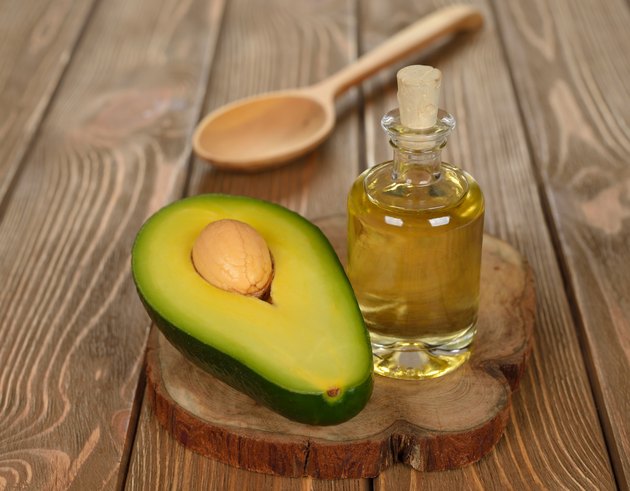Almond Oil, Olive Oil & Avocado Oil
Oils extracted from various fruits and vegetables have a long history of use in many cultures for both topical and dietary purposes. Almond oil, olive oil and avocado oil are just three of the many oils available that can be used in numerous ways. Each of these extractions is better suited for specific topical uses, such as for the skin and hair, and can be used for cooking to contribute individual health benefits and flavors.

Almond Oil
Almond oil is available in both bitter and sweet varieties. Bitter oil is sometimes used in the production of cooking oils and almond-flavored liqueur but contains cyanide and should not be consumed in large quantities. Pregnant and lactating women should avoid bitter almond oil. Sweet almonds do not contain cyanide and are safe for consumption. Sweet almond oil is rich in vitamin E, monounsaturated fats, proteins, fiber, calcium and magnesium.
Olive Oil
Olive oil is produced directly from the flesh of the olive and requires minimal processing to create; it generally contains little or no additives. Because heat can weaken the flavor and health benefits of olive oil, it should be stored at room temperature and eaten raw or cooked over very low heat. Olive oil contains vitamin E and monounsaturated fatty acids, which deliver numerous health benefits when consumed, according to the November 4, 2007 issue of “Alternative Medicine Reviews.” Researchers state that olive oil helps fight cancer, heart disease, high blood pressure, high cholesterol and may even help fight bacterial infections. The high fat content of olive oil may cause it to age quickly and it should be used within six months of being opened.
Avocado Oil
Avocado oil is cold pressed, which does not damage the flavor or nutritional content of the resulting oil or produce any oxidative damage. Avocado oil has a very mild flavor and withstands heat well, making it a useful and healthy cooking oil. This oil also contains vitamin E and monounsaturated fats. Avocado oil is also rich in chlorophyll and other phytochemicals, many of which have yet to be fully understood.

Usage Comparison
Vitamin E is a key component in the creation and maintenance of skin and hair, making all three of these oils useful in topical treatments. The presence of monounsaturated fats in each of these oils means that they will penetrate the skin more deeply. Avocado oil contains the highest amount of monounsaturated fats, followed by almond oil and olive oil. In addition to the topical benefits, monounsaturated fats contribute to heart health and lower the risk of heart disease. Sweet almond oil has a naturally pleasing odor and is commonly used as the base for massage oils and aromatherapy. The high fiber, protein and mineral content of almond oil also gives it a slightly more balanced nutritional content then the other two oils.

